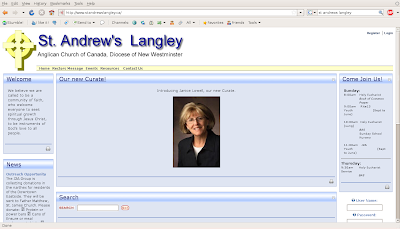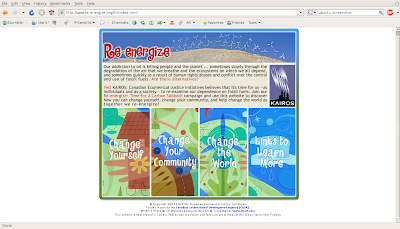I was on the phone today with the Rector of my Parish and we got to talking about the possibility of producing a video podcast of his sermons. I, of course, love the idea and hope very strongly that we can make it happen. But there are many considerations to be made. One major piece of such an undertaking is the manner of distribution.
YouTube Terms of Service: ugh. YouTube accessibility and proliferation: yayy. I personally prefer Blip.tv. Content providers retain copyright, they have a good range of embedable player options, provide RSS service, iTunes links...generally a good hosting service. The question then becomes, where to post the videos. This is a question because people don't go to blip.tv to find videos, they go to YouTube. Aargh.
The obvious option is to post on the Church's website. Let me show you the problem with that:
 Here we have a perfectly functional noticeboard. One of those ones put outside a church with the plexiglass over it and the little lock on the bottom. There is no interactivity here. Now, I'm not saying that a church website should be a social networking site. But I should have a reason to check back in on a website before I forget the url. I should want to have it as a bookmark, not have to Google it to find it.
Here we have a perfectly functional noticeboard. One of those ones put outside a church with the plexiglass over it and the little lock on the bottom. There is no interactivity here. Now, I'm not saying that a church website should be a social networking site. But I should have a reason to check back in on a website before I forget the url. I should want to have it as a bookmark, not have to Google it to find it.I should point out that I don't mean at all to pick on church webmasters and mistresses. Building and maintaining a website is a lot of work, and work that I certainly couldn't do. And it's not just the small churches that seem to have problematic websites. Let's take a look at the Anglican Church of Canada's website:
 It's like an overloaded iGoogle homepage. Little boxes, little text, too many categories, poorly formatted and highly frustrating. I don't want to spend time on a website finding information, I want to spend time on a website taking information in. For a step up, I can go to my diocese's website:
It's like an overloaded iGoogle homepage. Little boxes, little text, too many categories, poorly formatted and highly frustrating. I don't want to spend time on a website finding information, I want to spend time on a website taking information in. For a step up, I can go to my diocese's website:
Snippets of articles with easy-to-find links if I want to read more. Broad sections with easy and consistent navigation across the top. It's solid, readable, boring and just a little bit slow. For an example of something more direct and quite a bit faster (as far as navigation goes) here is a shot from the Anglican Church of Canada's environmental initiative website:
 Although the fonts, colours and graphics are clearly aimed at a "younger" audience, this is an excellent website. Simple categories with large clickable areas that lead to similiar sites further specifying information before giving you a large piece of information to read. While it may seem like more steps, this actually leads to faster navigation: the reader makes more choices to get to the information, but each choice is infinitely faster because each choice is infinitely simpler.
Although the fonts, colours and graphics are clearly aimed at a "younger" audience, this is an excellent website. Simple categories with large clickable areas that lead to similiar sites further specifying information before giving you a large piece of information to read. While it may seem like more steps, this actually leads to faster navigation: the reader makes more choices to get to the information, but each choice is infinitely faster because each choice is infinitely simpler.I could go on, but I won't. The point is that church websites are ugly, boring, slow and difficult to use for the most part, but that sometimes, when the work is paid for and contracted out, we can get very usuable sites. This said, I'd love to see some advocacy (I guess I'm volunteering myself for this, aren't I?) around a Diocese-level service provision to make templates and training available for churches to use to arrange useful websites. An RFP should be developed including the building of templates and infrastructure for such a project. Now, not every individual parish will want to express themselves the same way online, which is great, so the templates need to be flexible, and there will need to be an easy way for people at the parish level to maintain these websites. This needs to be built into the RFP. Another key aspect of the RFP would be a defined, short-term training period for interested parish members. Finally, server space, bandwidth and other infrastructure considerations need to be made by the proponents responding to the RFP.
The website issue addressed, I now return to the original topic of video podcasting. Once we have a useable, enticing webspace on which to post such content, it will be a welcome addition to it. Until such a time, however, it probably makes more sense to post and host off-site with a service such as blip.tv and blogger.com or another blog website. These services focus on ease-of-use and updatability as well as a strong syndication system. My immediate recommendation would be to build a presence on one of these sevices and provide a simple-to-find link on the church's main website.
No comments:
Post a Comment